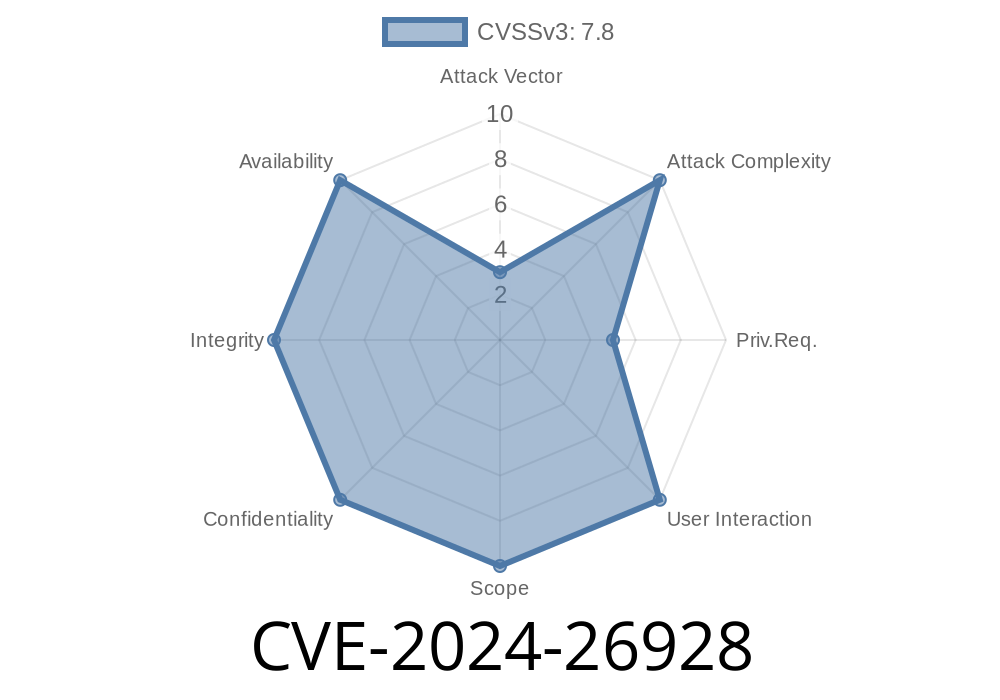Recently, a security flaw labeled CVE-2024-26928 was discovered and patched in the Linux kernel. This bug affects the CIFS (SMB) client—a component used for file sharing with Windows networks. The issue centers around a potential Use-After-Free (UAF) when displaying debug information via the cifs_debug_files_proc_show() function.
In simple terms, this means that an attacker can trick the kernel into using memory that has already been freed, which could lead to a system crash or, in the worst case, allow execution of malicious code.
The Technical Details
When the Linux SMB/CIFS client operates, it tracks connections to SMB servers in objects called *sessions*. These can be in different states—active or shutting down (tearing down, referred to as SES_EXITING). The cifs_debug_files_proc_show() function prints debug info for these sessions through the /proc filesystem (for example, /proc/fs/cifs/DebugData).
The Vulnerability
Previously, the function didn't check if a session was being taken down (SES_EXITING). If a session was in the process of being destroyed while debug data was being printed, there was a risk that code could access (use) memory that had just been freed—a classic Use-After-Free bug.
Vulnerable Code (Simplified Snippet)
/* Before the fix */
list_for_each_entry(sess, &server->sessions, smb_ses_list) {
/* ... */
cifs_debug_files_proc_show(sess);
}
If sess was already exiting, it could be freed *while* being processed in the loop.
The Patch: How Was It Fixed?
The kernel maintainers changed the code to skip sessions whose status is SES_EXITING, so only safe, active sessions are accessed for debug purposes.
Patched Code
list_for_each_entry(sess, &server->sessions, smb_ses_list) {
if (sess->status == SES_EXITING)
continue; // Skip sessions that are tearing down
/* ... */
cifs_debug_files_proc_show(sess);
}
This simple check prevents possible use-after-free incidents against dying sessions.
Exploit Potential
While attacking via this bug would be tricky (the attacker usually needs local access or a way to trigger session teardown and immediate debug info reading), a clever user could theoretically:
Trigger session teardown (unmount, disconnect, or force kill the session).
3. Immediately read /proc/fs/cifs/DebugData or similar debug files, hoping to access memory being freed.
If timed well, this might allow information leakage (reading freed memory) or sometimes kernel exploits, depending on correlating vulnerabilities.
Below is a *simplified* pseudo-process
# Step 1: Mount a remote share
mount -t cifs //server/share /mnt/share -o user=guest
# Step 2: Disconnect forcefully in one terminal
umount /mnt/share
# Step 3: In another terminal, quickly read debug info
cat /proc/fs/cifs/DebugData
This race is hard to win without lots of trials or a script.
Who Should Care?
- Users/admins running Linux SMB/CIFS clients on untrusted or multi-user systems.
- Distros/kernel maintainers—ensure your kernel includes the fix!
How to Fix
Update your Linux kernel to one that includes the patch for CVE-2024-26928. Major vendors will ship updates, or you can refer to the upstream commit.
References
- CVE-2024-26928 at NVD
- Kernel Patch Commit (lkml)
- Samba Kernel Module Documentation
Final Thoughts
Bugs like CVE-2024-26928 remind us that *even debug tooling* can be a source of security risk. Always keep your kernels up-to-date—even for smaller modules and features. If you run Linux servers that talk to SMB/CIFS shares, patch promptly!
*For deeper technical details, see the kernel commit log and discussion:*
> Commit: smb: client: fix potential UAF in cifs_debug_files_proc_show()
Timeline
Published on: 04/28/2024 12:15:21 UTC
Last modified on: 01/07/2025 16:44:17 UTC
